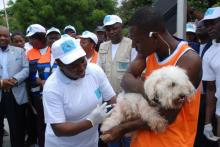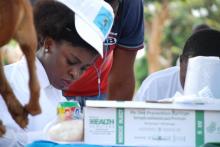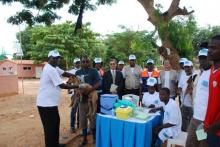Health authorities initiate multisectoral anti-rabies campaign in Luanda
Viana (Luanda/Angola), 30 March 2015 - A vaccination campaign against rabies in animals was launched on 27 March by Angolan authorities in Viana. The campaign is aiming to immunize 235 638 dogs, cats and monkeys targeting to control the current outbreak of this deadly disease that is affecting the province of Luanda, the most populous city of Angola with about 6.7 million inhabitants.
The main objective of the campaign is to cover about 70% of the animal population and to sensitize the population about the importance of vaccinating their pets against rabies to reduce mortality due to this disease.
In the first phase of this campaign, which is being conducted from 27 March to 3 April 2015, the municipality of Viana has mobilized 170 people, including vaccinators, supervisors and social mobilizers. The target established is to vaccinate 54 800 animals in one week. Viana was selected as the natural location to launch this campaign because this municipality has the higher number of deaths due to human rabies in the country.
Since January 2015, among a total of 34 deaths occurred in the province of Luanda, 13 fatal cases occurred in Viana. The following most affected municipalities are Cazenga (with 7 deaths), Cacuaco (6), Belas (3), Kilamba Kiaxi (3), Sambizanga (1) and Icolo and Bengo (1). The mortality rate for rabies is 100% and this is highly alarming taking into account that 80% of the victims bitten by dogs, drop out from the post-exposure treatment.
The vaccination initiative is being coordinated by a National Commission Against Rabies which includes the Ministries of Health, Agriculture and Social Communication, as well as the National Police, the National Army and Municipal Administrations. The campaign is also receiving technical support from the World Health Organization (WHO) and the Food and Agriculture (FAO) for its implementation.
According to the Provincial Public Health Director of Luanda, Dr Rosa Bessa, "in the future, this campaign will be organized in annual basis, in order to ensure the control and elimination of human rabies”.
The WHO Representative in Angola, Dr Hernando Agudelo, praised the national authorities for this initiative and urged all owners of dogs, cats and monkeys to vaccinate their animals. "Rabies is a disease that can be prevented through community awareness and regular mass vaccination campaigns, but whose impact on the population has become a serious public health concern in the country", he also warned.
The Governor of the Luanda Province, Eng. Graciano Domingos, also highlighted that "rabies remains a serious public health issue whose control requires a strong interaction among health, agriculture, community services, national police, civil society and communities.
During the launching ceremony, the municipal administrator of Viana, Manuel Caterça, announced that 92% of the human rabies deaths reported since January 2015, have occurred among children under 10 years, and urged all the owners to join the campaign, by bringing their pets to be vaccinated to stop the spread of rabies.
The Secretary of State for Agriculture, Eng. Amaro Tati, reaffirmed his commitment to ensure success of the anti-rabies vaccination campaigns, and urged all owners of dogs, cats and monkeys to support this effort aimed of vaccinated the animal population as the main way to prevent unnecessary deaths and to protect people’s lives.
From January to March 2015, the Luanda Province notified a total of 4290 animal bites. If this trend continues, the annual costs to ensure the vaccine for people bitten by animals with rabies, only in Luanda, could exceed US$ 6 million. The rabies vaccine for animals costs around 350 Kwanzas whereas the post-exposure vaccination for humans is 100 times more expensive.
Global estimates indicate that the African Region reports an average of 24 000 annual deaths due to rabies with more than 90% of these cases were caused by bites of dogs. In urban areas dogs are the main reservoir of this disease.
______________________________________________________
For more information, please contact:
José Soares Caetano, Health Information and Promotion Officer
World Health Organization
WHO Country Office in Angola
Rua Major Kanhangulo nr. 197- 7th floor
C.P. 3243 Luanda
Cell Phone: (+244) 912220543 ; (+244) 926 546 698; (+244) 917980250
Email: soarescaetanoj [at] who.int










